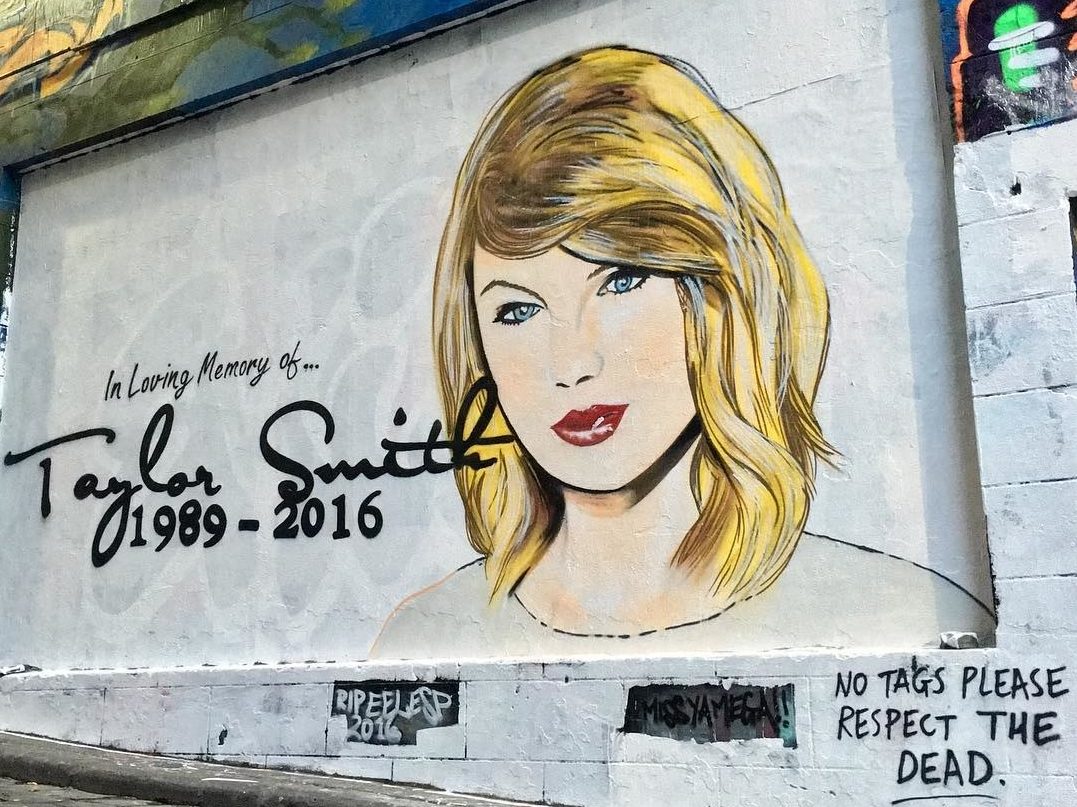
Melbourne-based artist lushsux‘s cheeky mural of Taylor Swift, reflecting the tide of public favor that has recently turned against her
POP PRINCESSES COME AND GO, but Taylor Swift is determined to stay.
She first entered the pop culture world with her heartbreak and guitar, and adolescent girls immediately and easily related to her and her music. She presented a conservative, girl-next-door image, endearing her audience to her.
Fast-forward to Kanye West’s interruption of her acceptance speech at the 2009 VMAs and the endless outpour of sympathy for her. This was the beginning of the Taylor-can-do-no-wrong era, which continues seven years later. She has, as expected, used it to her advantage, but there are numerous other actions of her own that need to be up for discussion.
Out of Bounds
Taylor Swift appears — especially in music videos — to be unaware of her privilege, and bereft of a team to remedy this.
In the Shake It Off video, Taylor wears various costumes as she interacts with people in costumes appropriate for their dance — for example, ballerinas in leotards. At one point, she tries to wear blackness as a costume. She wears a hoodie with the hood up over a cap and holds a boombox over her shoulder. In another scene, she wears clunky jewelry, short shorts, and a hairstyle worn by women of color in the ‘80s. She crawls between the legs of twerking women, sexualizing them and portraying an imbalance of power. The twerking women are later lined off behind her with their backs — and butts — to the camera. Twerking comes directly from black culture, and it is troubling that we do not see the women’s faces.
Intimate Partner Violence
Blank Space is disturbing, full of threats that could be mistaken for metaphor if it were not for the video.
Taylor shoves her lover, throws a vase at him, grabs his face before pushing him to the floor, and drops his cellphone into a pool. She brandishes an apple in a fashion reminiscent of scenes in Snow White. A few scenes later, her lover spits out a bite of the apple. Taylor leans over his unconscious body, then bites his lip. It was argued that the video parodies media portrayals of her, but it can be triggering for those who have experienced intimate partner violence.
Squad Goals Overactivated
In its earlier days, the “squad” was lauded for being an example of the power of friendships between women, but it has quickly become a prop.
Taylor Swift has taken the word — best known within black culture — and turned it into a facade of friendship. #SquadGoals is an exercise of collecting women to be friends in public. They take photos, praise one another, and flaunt their fame. Until recently, every member of Taylor’s squad was tall, thin, and conventionally beautiful, so she quickly added more diverse people following public critique.
“Feminism and friendship are supposed to be inclusive, and most of these ‘squads’ are strictly exclusive.” — Rowan Blanchard
By creating a squad, Taylor positioned herself as a queen bee, drawing a line between the “in” and the “out.” Many of her fans are young girls who could be struggling with self-esteem issues, bullying, and wealth gaps — just some of the obstacles girls face which can be exacerbated by such squads. Taylor seems to be trying to perform her feminism while putting herself on a pedestal.
Capitalism At All Costs
While most — if not all — people in the music industry have the primary purpose of making money, Taylor Swift is building an empire. She uses her privilege to further elevate herself, not to bring others up. She sells herself as the innocent girl-next-door type, manipulating fans through story-weaving. Victimhood has been her weapon for a long time, but #SquadGoals has become a large part of her strategy. Even as she promotes the idea of friendship, she had her friends appear in the music video for “Bad Blood” without paying them. This is contradictory to the goals of feminism she claims to espouse, especially considering her copyright spree. Taylor is comfortable with taking ownership of — and using — other people’s work and cultures, but does not want anyone to profit from a string of words she was not the first to utter. She has filed more than 30 trademark applications since fall of 2014 for terms including “Party like it’s 1989,” “This sick beat,” and “Nice to meet you, where you been?”. Her good-girl image may not withstand her astute and unrelenting business side.
Talking Instead of Listening
When the 2015 VMA nominations were announced, Nicki Minaj commented on the institutional racism she suspected kept Anaconda from receiving a nomination. She brought attention to the celebration of thin white bodies at the expense of others. Taylor Swift responded to Nicki Minaj, accusing her of pitting women against each other, and tooted her own horn for supporting Nicki. Twitter responses explained that no one was talking to her, or specifically about her. If she had anything to add to the conversation, she should have been using her privilege to amplify Nicki’s voice. Taylor later apologized, and shared the stage with Nicki Minaj for a performance, but the Twitter fiasco has not been forgotten.
Taylor Swift is building an empire, growing in strength and reach. People love and identify with her music, but her politics are a cause for concern. She takes the music business seriously, and is focused on amassing wealth, but it would benefit her to learn more about feminism in practice if she wants to keep using the label to relate to women and girls. She does not seem to have an understanding of race consciousness, or an understanding of intersectionality, but she does have a strong team — not to be confused with her squad — behind her to give her business and legal advice. It would be wise and worthwhile for her to diversify said team to ensure that she learns from her mistakes, and lives up to the values she often references. Rather than using other people’s cultures to look cool, she can appreciate and draw inspiration from them, but with responsibility and respect as prerequisites. As a pop culture icon with access to limitless resources, this is the least she could do.
















